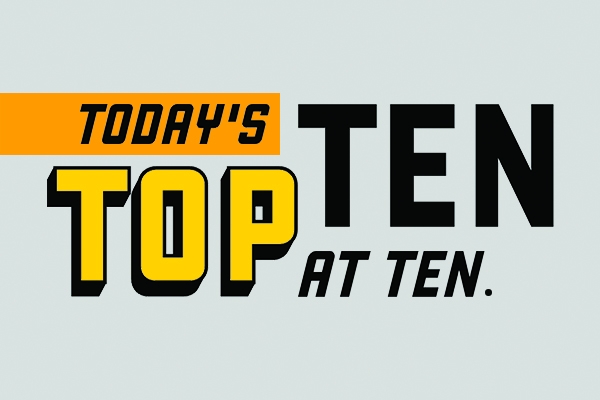
Today's Top 10 is a guest post from Sally Owen, Kate Preston, and Nathan Chappell, research analysts at the Motu public policy and research institute.
As always, we welcome your additions in the comments below or via email to david.chaston@interest.co.nz.
And if you're interested in contributing the occasional Top 10 yourself, contact gareth.vaughan@interest.co.nz.
See all previous Top 10s here.
1. The economics of gender and the invisible work force.
If you are a cow, your milk is measured as part of GDP. If you are a breastfeeding mother, yours is not. Dr Julie Smith says that this is not the only example of the 'invisible' contribution many women make to the economy. Do the economics of gender come down to choice or inequality? This is just one of the excellent podcasts by Australian economists Gigi Foster and Peter Martin, which are all well-worth a listen.
2. The nation that thrived by ‘nudging’ its population.
Singapore has recently embraced Nobel-prize winning nudge theory to improve the lives of its citizens. A ‘nudge’ is a subtle change in the environment that encourages a certain behaviour, such as healthy eating, without removing choices. Singapore has historically used similar techniques, ranging from the subtle nudge (placing rubbish bins away from bus stops to separate smokers) to big shoves (forced savings programmes). Evidence clearly shows that nudging is effective – but are people happy with these developments? As discussed in the article, the limited research suggests that people in liberal democracies are happy being influenced when it aligns with their values and interests.
3. How Capitalist Is Singapore Really?
An interesting take on capitalism and "economic freedom", discussing the case of Singapore. To steal words from the author Matt Breunig: "Is capitalism primarily about markets or private ownership? Relatedly, is socialism primarily about ending markets or promoting collective ownership?"

4. The 2018 World Happiness Report.
This report ranks New Zealand in 8th place for happiness (the same placing as last year). Most of this year’s report focuses on the interactions of wellbeing with migration (New Zealand was ranked as the second most accepting country of immigrants, closely behind Iceland). But the final chapter of the report by Jeffery Sachs is dedicated to the Easterlin Paradox, which is much more striking in the US than in other countries. That is, happiness in the US is stagnant or declining even though income continues to grow. Sachs points to obesity, substance abuse and depression as potential drivers of this phenomenon. Measures of public health in the US have not improved as much as in other high-income countries and have even declined in recent periods. Five hypotheses as to why the US is suffering these health epidemics are provided: high levels of inequality and poverty in the population; the interrelation of these problems amongst themselves (the pathways from each of obesity and substance to depression and vice versa); the high cost of healthcare; corporate deregulation (fingers are pointed at the fast-food industry and pharmaceutical companies); and the rise of social media and increasing time spent by individuals in front of screens.
5. This New MIT Master's Program Doesn't Require A College Or High School Degree.
MIT is revolutionising the way post graduate university applicants are chosen. The current entry system is flawed in that, “if you come from the University of the Middle of Nowhere, we have no way to judge the quality of your application”. So, in a revolutionary move, MIT is letting students take online courses for credit, with no requirement of a degree or high school diploma. Then, if they perform well on exams, those students can apply for a master's degree program on campus, at a significantly lower cost to usual. Poverty Action Lab's Ester Duflo is involved, with their master's program in data, economics and development policy being offered as part of the scheme.
6.Whose University Is It Anyway?
In this article, Canadian academic Ron Srigley laments the takeover of universities by administrators, both in terms of numbers and power. He argues there are four key symptoms of this takeover: the lack of critical thinking skills learnt by students; the steering of the curriculum away from liberal arts and pure science; the immunity of administrators to downsizing and questioning; and the exorbitant salaries of university presidents. You don’t have to agree with everything in this piece to feel troubled by the all-administration university.

7. An employee whose job was to be sacked.
An oldie but a goodie. This anecdote suggests Harrods employed someone to pretend to be sacked to appease customers following major complaints. Who can predict what jobs companies' will be willing to pay for?
In this article, Julia Cagé and Valeria Rueda report on their study into the long-term effects of Christian missions in sub-Saharan Africa on the prevalence of HIV. Christian missions helped bring Western medicine to this part of the world, but also transferred religious views around sexual behaviours. The study finds that regions closer to missions tend to have higher rates of HIV, except where the missions specifically invested in health, in which case the regions have relatively low HIV prevalence today.
A very cool map, giving the translation into English of every country name. This is for those word-nerds out there (there are a few at Motu).
10. Effects of retroactive prayer on hospital patients.
The author of this published study randomly split 3,393 hospital patients from 1990-1996 into a control group and a treatment group. He then had people in the year 2000 pray for these 1990s patients to have a good recovery. The author found statistically significant evidence that prayer can reach back in time and cause a shorter stay in hospital and a shorter fever. He concluded that we should pray retroactively and make people healthier. We conclude that something fishy is going on, and that not all published findings are true.
8 Comments
#3 Capitalism v Socialism - i find most people to be polarised, but feel that if open minded, then somewhere in the middle is perhaps where the ideal lies.
#4 Happiness in the US where obesity is an issue - have some things such as comfort foods become too easy? this sort of relates to #3, in the great capitalist society the promises are big, but the obstacles are also big, so when people struggle the comfort foods (and drugs) remain easy to reach.
#7 Just gotta ask this, if they hired someone for the specific purpose of being fired for a customer complaint, what happened to the individual who actually was the origin of the complaint? Did they survive to piss off another customer(s). How is that good for business?
#3 ""Is capitalism primarily about markets or private ownership? Relatedly, is socialism primarily about ending markets or promoting collective ownership?""
The answers are obvious: 'markets' and 'collective ownership'. Capitalism is the best way of relating supply and demand and that means a market. It get interesting when there are desired items that cannot be manufactured: Rhino horn, Land, current most famous singer.
#5 that was exactly what I did for a mid-90's MBA. A year's prelim (Ops Research is the only one I remember) to ensure there were no ability-to-study glitches, Duly aced, after which it was plain sailing. If such a pressure-cooker program could ever be termed that....
The article in #3 sounds a little bit biased. The appropriate campaign slogan would be: “We will lower taxes, and with the surpluses we have from our prudent fiscal management we will buy and/ or start companies that will compete on the open market with everyone else’s companies (similar to New Zealand’s Air New Zealand).”
I wonder what % of NZ land is crown owned including land under pastoral leases to farmers. I reckon that it is likely to be similar to Singapore’s.
We welcome your comments below. If you are not already registered, please register to comment.
Remember we welcome robust, respectful and insightful debate. We don't welcome abusive or defamatory comments and will de-register those repeatedly making such comments. Our current comment policy is here.